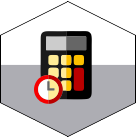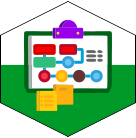
Today’s chief audit executives, their deputies and internal audit managers need to work closely with business leaders, boards, audit committees, peers and their own audit teams. Now more than ever, leadership, stakeholder relations and influencing skills are becoming as important as managing a team, planning and delivering insightful internal audit assurance, and consulting engagements.
Objectives of the training
By the end of the course, participants will be able to:
- Define internal audit, its scope and function within the company
- List the internal audit standards constituting the framework of the internal audit activity
- Distinguish the types of internal audit assignments related to operational, compliance or financial internal audit Describe the internal audit fieldwork guidelines and apply techniques for risk identification, controls identification and controls testing
- Select the appropriate internal audit test tools and list the advantages and disadvantages of each
- Identify best sampling techniques in an internal audit assignment in terms of sample size or sample selection
- Recognize fraud and express internal auditor’s responsibility upon fraud detection
Target Audience
Chief audit executives, deputy heads of audit, internal audit managers and senior internal auditors who deal with business leaders and/or lead or manage members of the internal audit team. This course is equally valuable for both in-house and outsourced internal audit teams.
Course Content
Day 1-Internal Audit Overview
- Risk and internal audit overview
- Definition of risk
- Types of risk in an organization Functions of management: planning, organizing, implementing and controlling
- Defining internal audit
- Internal audit as a function of corporate governance
- Scope and building blocks of corporate governance
- Reasons to have an internal audit function
Day 2-Functional Requirement of Internal Audit
- Distinguishing internal from external auditing
- Scope of internal auditing: the internal audit
- charter
- Staffing the internal audit function
- Role of audit committee
- Internal audit standards
- Attribute standards
- Performance standards
- Types of internal auditing
- Performance auditing
- Operational auditing
- Financial auditing: accounting cycles audited by the internal audit function
- Compliance auditing
Day 3-Performing the Internal Audit functions
- 20 questions directors should ask about the internal audit function
- Internal audit implementation: fieldwork guidelines Information gathered by internal auditors 4 qualities of information
- Sources and nature of information Assessing the degree of persuasiveness
- Types of engagement procedures 15 internal audit test tools
- Observation
- Interviewing: a disliked technique Interviewing skills: how to run a successful interview Role play: internal auditor in action
- Examining records
- Verification and confirmations
- Vouching and tracing Re-performing
- Internal audit working papers Best practices for managing working papers
- Retention policies Communicating fieldwork results and recommendations Legal considerations for communicating results 4 attributes of an observation or recommendation
- Disseminating results and exit meetings
- The fieldwork: risk-based auditing
- Defining management assertions
- Risk assessment process
- Reason for risk based audit planning
- Evaluating risks
- Techniques to identify the auditable units
- Criteria for selecting auditable units
Day 4-Risk Based Audit and Audit Framework
- Scoring and weighing risks Prioritizing risk and developing audit plan
- Methods to generate list of risks Identifying entity level controls to mitigate risks
- Broad definition for types of controls Essential components of effective internal control system: 'COSO' model Criteria for unsatisfactory rating for control components
- Methods to generate list of controls Insights on flowcharting for understanding cycles and controls
- Testing of internal controls Design and implementation of an internal control
- Operating effectiveness of an internal control
- Tips and tools for audit sampling
- Fraud
- Definition and characteristics of fraud
- Internal auditor’s role in a fraud case
Fee
₦215,000
Course Outline
Fill the form below and the full course content will be sent to you
-
Accounting & Finance

-
Leadership

-
Quality Control

-
Human Resources

-
Interpersonal Skills & Self Development

-
Secretarial & Administrative

-
Warehouse Management

-
Audit & Finance

-
Health And Safety

-
Contract, Project And Procurement Management

-
Planning And Strategy Management

-
Digital Innovation And Transformation

-
Data Management & Business Intelligence

-
Virtual Learning